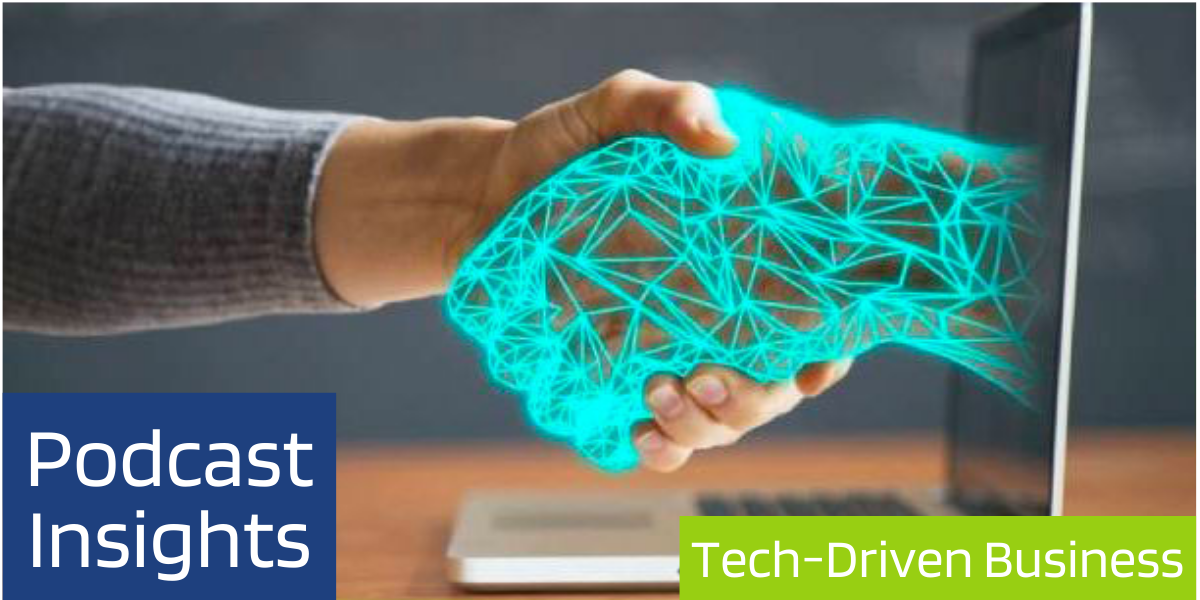By Mariyah Saifuddin

As organizations continue to innovate and use the latest developments in technology, it’s natural to wonder how existing technology fits in. David C. Williams, of AT&T, recently rejoined our “Tech-Driven Business” podcast to talk about the convergence of artificial intelligence, or AI, and robotic process automation (RPA).
Speed and efficiency are at the forefront for businesses, and that is where AI and RPA work best. According to Williams, all of hyper-automation, but especially RPA, is one of the least expensive ways to solve a business problem with software.
“Artificial intelligence is the computing power we’ve dreamed of,” Williams said. “When you take that type of computing power and intelligence and give it an efficient reach like RPA, you can go do a lot of cool things very quickly and it doesn’t cost your arm and leg.”
AI is like the brain of it all, Williams said. “Just like in a human body, a brain is great, but it can’t move anything physically, right? And so you need all these extremities to go about the brain’s business every day.”
That’s how AI and RPA come together, he said. “You have the most intelligent computational brain that you could imagine or dream of, with mobility of RPA that’s so flexible, so ubiquitous, so applicable in so many ways that when you put the two together, it’s exponential,” Williams said.
Why is this good for business?
Take, for example, the need to gather and share information. There also is the goal of how to best summarize that information and send it out quickly and effectively. When we look at AI and RPA, AI is the technology that can quickly query and summarize the knowledge needed. RPA makes that knowledge accessible and usable.
Williams’ team sits at the very forefront of where that technology is heading. As he thinks about where it’s going with the addition of AI, he said, “AI is going to take our most challenging parts of the development cycle, the most challenging parts of every business or many businesses, and it’ll simplify.
“When I think of that, I think about a world where RPA is even more democratized, where literally any knowledge worker can use RPA. Instead of putting up PowerPoints, we can share prototypes.”
For Williams, it is about opening up an entire universe of innovation and automation.
Using technology systems to run businesses can look differently for companies. However, at its core, it is about finding ways to put building blocks in place to accelerate the adoption of new technologies. As soon as users see the value of RPA, they begin to depend on it and ask for more.
Williams explained: “The more things that we build, the more we get to leverage. At one point, we were using bricks to build buildings, then we’re using buildings [to build blocks,] blocks to build cities, cities to build, etc.”ed
Opportunities
It is just a matter of time before companies begin to fully leverage and solve more complex business problems. And they’ll do it faster, cheaper and with bigger impact, particularly in regard to the competition.
With efficiency comes the ability for organizations to capitalize on the aspects of business in which they excel. RPA is the least expensive hyper-automation available to solve a business problem, Williams said. Add cognitive capabilities on top, and that means tackling the more complex things in the most economical way.
Is AI Replacing RPA?
Williams used an analogy to address the question of whether AI is replacing RPA. “The Wright Brothers have mastered human flight,” he said. “We’ve discovered human flight. We all can fly now. Nobody needs tires anymore.”
AI and RPA go together, Williams said. You cannot replace one with the other. Likely, as long as you have one, you will want the other.
“If you have RPA, you want cognitive capabilities to make those automations smarter so you can automate more things,” Williams said. “If you have AI, you want reach and you want quick reach because with AI you get quick answers.”
While organizations continue to develop the role of AI and RPA in their firms, Williams’ message is clear. Embrace AI quickly. Move safely with it. RPA and AI play different roles that are extremely complementary to each other.
Based on his decades of experience, he cautions teams not to make the mistake of putting all their eggs in one basket as it applies to technology. Leaders should think about the power of AI and RPA coming together to get further, faster.
Interested in more Tech-Driven Business podcasts? You can listen here
About David C. Williams
 During David Williams’ career with AT&T, he has created deep-link HTML marketing initiatives that garner 90 million monthly impressions, has led competitive intelligence which helped shape AT&T’s mobile first strategy, has been responsible for supporting several Fortune 500 companies encompassing $120 million in revenue, and authored two patents for Reprogrammable RFID and bridging satellite and LTE technology. In his current role, Williams is responsible for hyper-automation and emerging technology to transform customer/employee experience and cost structure for his organization. He leads the largest Robotics Process Automation program worldwide. His innovations are driving change across the company as his team has developed 600+ Bots automating 70 million contacts, realizing $400 million in operating income at over 3,000% ROI. Additionally, he also invented and sponsored a decision engine that has driven a $200 million annual credit reduction.
During David Williams’ career with AT&T, he has created deep-link HTML marketing initiatives that garner 90 million monthly impressions, has led competitive intelligence which helped shape AT&T’s mobile first strategy, has been responsible for supporting several Fortune 500 companies encompassing $120 million in revenue, and authored two patents for Reprogrammable RFID and bridging satellite and LTE technology. In his current role, Williams is responsible for hyper-automation and emerging technology to transform customer/employee experience and cost structure for his organization. He leads the largest Robotics Process Automation program worldwide. His innovations are driving change across the company as his team has developed 600+ Bots automating 70 million contacts, realizing $400 million in operating income at over 3,000% ROI. Additionally, he also invented and sponsored a decision engine that has driven a $200 million annual credit reduction.
Williams is the 2021 Legacy Award recipient at Black Engineer of the Year STEM Global Conference, a two-time Dream in Black winner, the AT&T Champion of Diversity Award winner, a proud mentor of multiple employee groups, and a diversity ambassador. Williams’s humble beginnings in the poorest corner of Dallas continual giving back through Solar Robot Workshops to the community, and rise through a corporate giant is encapsulated in his book, “Business Model.“

